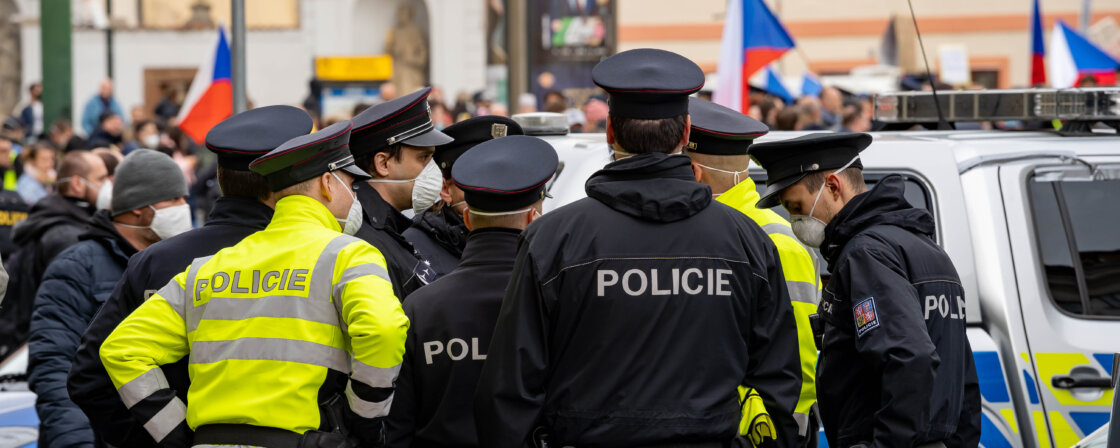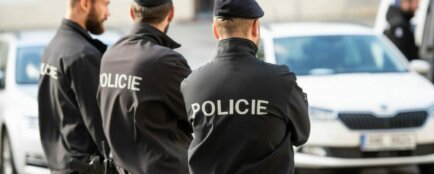What is the difference between city and state police?
You may have been saying to yourself up until now that it’s “cop as cop”. But in reality, there are two types of police officers – that is, members of the state police (the Police of the Czech Republic) and officers who fall under the municipal police (called municipal police in cities). Although the powers of municipal police officers have expanded quite a bit in recent years, they still have slightly less authority than state police officers.
An example of different powers may be the power (or lack thereof) of officers to take action in connection with criminal offences. However, if they have information about such an offence, they pass the notification on so that the offence can be properly investigated.
Both police officers and municipal police officers are public officials, which on the one hand provides them with special protection, mainly enshrined in the Criminal Code, which, among other things, regulates the crime of assaulting a public official. At the same time, their conduct is also subject to greater emphasis and responsibility, which in turn corresponds to the facts of the offence of abuse of authority of a public official.
The municipal police, which are regulated by the Municipal Police Act, operate primarily on the territory of the municipalities that have established them. Its tasks include, in particular, the supervision of public order, the control of compliance with generally binding ordinances and the settlement of misdemeanours. The Police of the Czech Republic, on the other hand, has broader powers, for example, in the area of criminal offences or interventions against organised crime.
The municipal police officers are authorised to control compliance with municipal regulations, such as proper parking or night-time peace. In contrast, the powers of the state police are enshrined in the Police Act, which covers a wide range of activities from crime prevention to interventions against terrorist threats.
Are you solving a similar problem?
Do you believe there was an overstepping of police authority?
Have you had a conflict with a municipal or state police officer and believe the officer exceeded his or her authority? We will be happy to help you. Describe your situation to us and our experts will provide you with a legal opinion within 48 hours.
I want to help
- When you order, you know what you will get and how much it will cost.
- We handle everything online or in person at one of our 6 offices.
- We handle 8 out of 10 requests within 2 working days.
- We have specialists for every field of law.
There are also differences between the founder and general status of the two services. The Police of the Czech Republic is an armed force of the state. Its main task is to prevent and detect crime and to protect the security of persons and property. The powers of the members of the Police of the Czech Republic are regulated by the Police Act.
The individual police departments are:
- police Presidium
- departments with national competence
- regional police directorates
- units established within regional directorates (there are 14 of them and their territorial districts coincide with the territorial districts of the 14 regions of the Czech Republic).
The most senior is the President of the Police, who recently became Martin Vondrášek. He reports directly to the Minister of the Interior. Under him work the deputy police presidents and the 14 directors of the regional directorates with responsibility for individual regions.
The municipal police (called municipal police in the case of towns) are established by individual municipalities. Its primary task is to oversee compliance with municipal ordinances, public order, parking in the city, and to deal with common altercations, citizens under the influence of alcohol, and so on. Constables have powers somewhat similar to those of the Czech Police, yet they have fewer of them. They are governed by the Municipal Police Act.
Tip for article
Tip: We have devoted our next article to the call for explanations and the process of such explanations.
How to tell a municipal police officer from a police officer?
When you meet a uniformed man in black who asks you for identification, for example, you can usually tell at a glance whether he is a police officer or a constable. Although not all police officers wear the same uniform, you will typically see a man or woman on the street dressed in black, with a white or yellow POLICE sign on their back. The badge is usually worn on the uniform on the left side of the chest. It bears the inscription “Police of the Czech Republic” and a six-digit number. On the left sleeve the policeman wears a patch with the state emblem and the inscription “Police”. A criminal officer wears the badge of the Criminal Police and Investigation Service in a holster together with his service card.
Tip for article
Tip: Many of us still remember to carry our ID card at all times and never go out without it. However, this has not been the case for many years and no one should be penalised for not producing their ID. When and to whom do we have to show our ID cards? Find out in our next article.
A police officer should always prove his or her affiliation with the police if he or she makes any kind of representation to you. This is especially true for non-uniformed officers. In the case of an urgent intervention (for example, a threat to life or property), the officer need only announce “Police”, which should be followed up by proof of identity with a service uniform with number, or a service card, or possibly a badge of the Criminal Police Service.
The uniform of municipal officers is also black according to the legislation, but the details vary from municipality to municipality. Thus, a Prague constable will look different from, for example, a constable from Rožnov pod Radhoštěm. The officer wears a municipal police badge with an identification number and the name of the municipality on the right side of the chest. On his left sleeve he wears a patch with the name of the municipality.
What are the general powers of a municipal police officer and a police officer?
First of all, it should be emphasized that both police officers and constables are only allowed to do what the law expressly permits them to do. This is the basic framework of your potential interaction with the police.
Both police officers and constables are generally authorised to carry out so-called acts and interventions. While an act is the securing of certain obligations without the use of force(summoning a personto give an explanation, establishing a person’s identity, etc.), an intervention is an act that directly enforces a legal obligation or directly protects rights by using force or the threat of force (for example, the use of handcuffs).
If a police officer or constable intervenes against you, he or she should first of all prove his or her affiliation to the (municipal) police, and before carrying out the intervention, he or she should use the call “In the name of the law” and also inform you of the legal grounds for it. If the action (intervention) involves interference with a person’s rights or freedoms, you must be advised of your rights and obligations. If the circumstances prevent this, then, exceptionally, you may be given this information afterwards.
Both the police officer and the constable may ask you for help and you as a citizen are obliged to provide it. Everyone is required by law to obey a summons, instruction or request from a police officer without undue delay. An exception applies if the law allows (or requires) you to do otherwise. For example, a police officer can generally ask you to give an explanation, but you have the right to refuse in certain circumstances – in which case the officer cannot force you to give an explanation.
Tip for article
Tip: Have you received a summons to explain yourself to the police? Do you not know exactly what it is about and do you think you will make yourself more difficult during the questioning? Don’t leave anything to chance and consult an Accessible Lawyer beforehand.
If you refuse to obey a police officer’s summons (without the legal right to do so), you could be fined for the offence of disobeying a public summons.
Below are some of the powers that officers and police officers have. However, it always depends on the particular situation in which the powers can be used. It is true that the powers (rights) of the municipal police are narrower than those of the state police.
For example, the right to:
- to produce a person,
- to prohibit entry to specified places,
- open a flat or other enclosed space,
- seize or provisionally seize an object,
- handcuff a person,
- detain a person (in this respect, the Police of the Czech Republic has broader powers, which may detain a person for up to 24 hours; the officer may only bring the person to the police),
- use coercive means, a dog or a service weapon,
- make audio, visual or other recordings from places open to the public,
- deal with traffic offences (who has the authority to deal with a particular offence depends on the type of offence),
- to investigate and clarify a traffic accident (here the powers are conferred by law only to the Police of the Czech Republic),
- to measure the speed of vehicles on roads (this authority belongs primarily to the Police of the Czech Republic, the role of the municipal police is only supportive here).
Tip for article
Tip: We have discussed individual police actions (such as identification of a person, detention, search) and their course according to the law in a separate article.
What is a police officer not allowed to do?
Given that he may do only what is permitted by law, we could infer that he may not do anything that is not permitted by law. But let us at least mention a few things that may seem obvious to some, but which some of us have nevertheless encountered.
You are not allowed to be a police officer or a constable:
- Prohibit you from making an audio or video recording.
- Legitimize you for absolutely no reason.
- Take actions or interventions that he or she has the legal right to take, but only in certain circumstances that have not now arisen (e.g. a body search).
- Request a search of your luggage, car interior or luggage without justification.
- Be rude, rude or ironic or even swear at you.
- To test you on regulations. In the event of a traffic violation or other violation of the law, he or she should tell you what you have done.
It probably depends on the extent of the violation whether, in such a case, you prefer to pretend that everything is fine and “do nothing” or speak up. While the police officer’s pointed question, “So, Mr. Driver, do you know what you did?” as a test of the law, you’ll probably get away with it and wave your hand, you’ll hardly mind an unwarranted body search.
Finally, let us add what rights citizens have. According to Article 2(4) of the Constitution, “everyone may do what is not prohibited by law, and no one may be compelled to do what the law does not require.” For individuals, therefore, the opposite principle applies.
Summary
A municipal police officer and a police constable have different powers and duties under the Municipal Police Act. Police officers have broader powers, such as in the area of criminal offences, while constables focus on maintaining order in municipalities, enforcing municipal ordinances and dealing with misdemeanours. Both wear uniforms with clear identifying features – police officers wear the word “Police” and the national emblem, while constables wear a badge with the name of the municipality.
When interacting with both forces, it is important to respect their authority, but also to know your rights, such as the ability to refuse to give an explanation in certain circumstances. Both police officers and constables may use force or challenge “in the name of the law,” but must always act in accordance with the law. Violation of a summons or failure to obey can lead to misdemeanor fines.
Frequently Asked Questions
What are the main powers of the municipal police under the Municipal Police Act?
The Municipal Police Act defines exactly what a municipal police officer may do. In particular, the municipal police supervise public order, check compliance with municipal ordinances, deal with misdemeanours, supervise traffic and can measure the speed of vehicles. However, the powers of the municipal police are narrower than those of the Police of the Czech Republic – for example, they cannot investigate criminal offences, which must be handed over to the state police.
What is the difference between the powers of municipal and state police?
The Municipal Police operates only in the territory of the municipality that established it, and its activities focus on prevention and supervision of public order. The Police of the Czech Republic, on the other hand, has a nationwide remit and broader powers, for example in the area of criminal proceedings or intervention against organised crime. A municipal police officer therefore acts under the Municipal Police Act, while a police officer of the Police of the Czech Republic acts under the Police Act.
What can a municipal police officer ask me to do during a road check?
A municipal police officer may stop you and ask you to produce documents if he or she suspects you of committing an offence (e.g. bad parking or speeding). He or she may impose a block fine or summon you to give an explanation. However, it does not have the power to search your person or check your luggage – these rights of the municipal police are limited and fall under the remit of the Czech Police.
How can I defend myself if I believe that a municipal police officer has exceeded his or her authority?
If you believe that a municipal police officer has acted in violation of the Municipal Police Act, you may file a complaint about his or her actions with the municipal police department or directly with the municipal police department (i.e., the municipal authority). In more serious cases, the matter can also be dealt with through the courts. It is advisable to have witnesses or evidence (e.g. a video recording).
Do I always have to obey a call from the city police?
Yes, every citizen is obliged by law to obey the call of a municipal police officer without delay, unless otherwise specified. However, this obligation only applies if the summons is issued in accordance with the law. In case of doubt about the legitimacy of the intervention, it is possible to complain or contact a lawyer. The rights of the municipal police are limited by the legal framework and therefore any intervention must be justified and proportionate.




